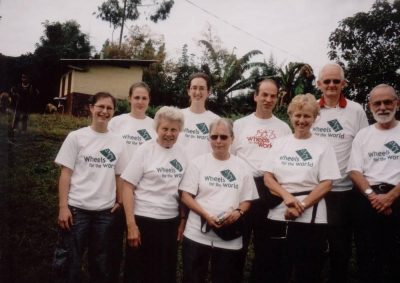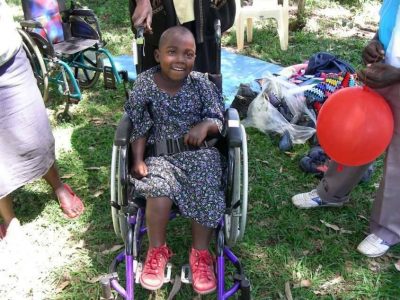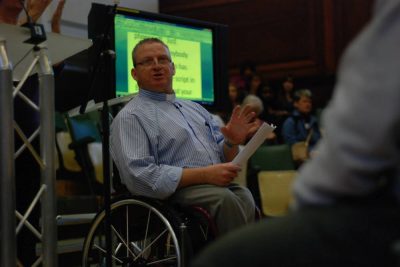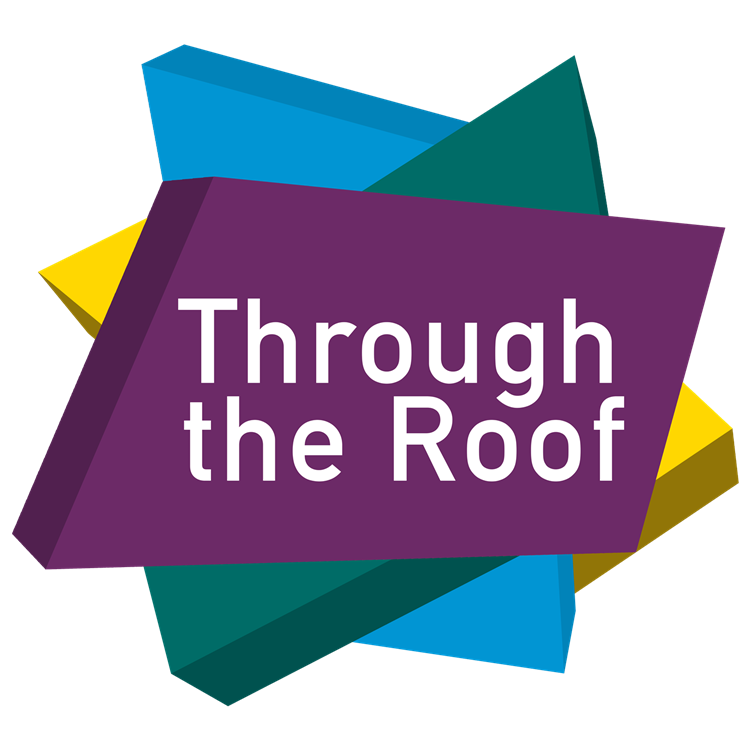Introducing Becky...
"Being on a Wheels team is an amazing chance to make a real difference, meet amazing friends, eat strange foods, swim in algae covered swimming pools, fly in tiny planes, go on long wiggly bus trips but most of all have great fun doing God's work!"
My name is Becky Nightingale and I'm a Christian worshipping at Highfield Church, Southampton and working as a Senior Physio at Southampton Hospital.
I first fell in love with Africa as a student, having travelled to Uganda,and I realised God had bigger plans for me as a physio than just working in the NHS. I started going on Wheels trips in 2005 and have been to Nigeria, Ethiopia and Kenya. Wheels has enabled me to enjoy my passion for Africa while staying in full time employment in the UK. I have been able to travel with my best friend and husband as a part of several teams and have also made amazing friends whilst on the trips.
For me, arriving in country seeing disabled people crawling in mud around a market and seeing children with huge birth deformities is heart-breaking. I truly don’t believe that the huge gap in health care, sanitation and education is how God intended the world to be. However working with Wheels gives me the opportunity to use my skills for God to vastly improve peoples’ lives and to use the wheelchairs as a tool to talk to people about God’s love for them. It is amazing to see a child walk for the first time or have the freedom of movement by sitting in a new wheelchair.
It is important that all the people we meet as a team realise that they are very special and perfect in God’s eyes. I remember on a trip to Ethiopia I was distressed to meet a very unwell child who we could not help in a practical way. However, through our work as a team we showed that family God’s love which was very important for them and community around them to see.
Mine and my husband experiences with Wheels have made us very much consider doing further work in Africa for longer periods of time, so watch this space...!!
Food for thought...
Through the Roof's Development Manager, Tim Wood, along with long-term TTR trainer, Norma, ran a session on Autism for New Malden URC. Here's some of the feedback:
"The whole event was enlightening, informative, clear and helpful."
"Your course has been very thought provoking and useful. We have gone away with very helpful ideas."
"I enjoyed it and it gave me lots of food for thought."
Wheels to Uganda

Through the Roof will be sending a Wheels for the World wheelchair distribution team to Uganda in June 2010. This will be our first time in Uganda, partnering with Non Government Organisation RILD (Response Initiative for Learning Disabilities).
Ethiopia 2009

The team used the the EECMY School for the Deaf in Nekemte as their base for the wheelchair distribution. In total about 90 people were assessed, provided with wheelchairs or other equipment, given a Bible and prayed with.
A highlight was talking with and giving Bibles to some Muslims, including an Imam, who were very open because of the love they had experienced from the team.
Kimilili, Kenya 2009

Returning to Kimilili, one of the Wheels team's regular distribution centres, the seven strong Wheels for the World team were encouraged as they saw changes which had greatly contributed to the integration of disabled people into the community.
Just one example was a young girl who was unable to walk due to cerebral malaria. Her mother had been carrying her to school but was no longer able to do so. Now she has a wheelchair, the girl will be able to go to school and to travel around the village.
Training in Malawi

By TTR Trustee, John Naudé
In the summer Belinda, Samuel and I (and another couple from church) went to Malawi with a missionary organisation called Emmanuel International for the first time. Belinda and I led the training on leadership and discipleship to church elders. Being a wheelchair user AND a pastor of a church is something that the people in Malawi certainly didn't seem used to, however they were very receptive to what we had to teach. It seemed the 'status' of being a pastor far outweighed any negative messages of being disabled. Wherever we went I was followed by children who seemed fascinated by my lightweight wheelchair.
The issue of disability in Malawi is something that is hidden. The number of people I saw with a visual disability was very few. I think I saw 3 people in wheelchairs in the 3 weeks we were there. I perceived that disabled people are generally kept at home and not seen as people with something to contribute to society. Malawi’s physical environment is not very suitable for wheelchair users and although I managed to access all venues - it was only through the help of friends and a bit of creative thinking that we managed to access everywhere. At one point there was a large gulley with a plank of wood across it for people to walk across. They found some extra wood and managed to tie various bits of wood together for me to push across. It wasn't a 'safe' bridge across with level and very stable bits of wood, but they had gone to great effort to enable me to cross. Thankfully, with my own wheelchair skills and a fair few prayers quickly offered up, I managed to cross it several times a day.
I had been mentally prepared for the changes to my usual routine and wheelchair-friendly environment but by the end of the three weeks I was physically very tired.
The most memorable part of the trip was seeing God's faithfulness in the protection and provision for our family and seeing Him at work in the lives of the people. The country was also a lot greener than I had imagined, but like most places the thing that sticks out is not the scenery but the people. They were a wonderfully generous and hospitable people.
The most difficult element of my time there was pushing my wheelchair on soft sandy terrain, to then have the hard uneven terrain. That was the tiring part of the trip. However, God really blessed us as a family and as a church by seeing Him at work and in the privilege of serving Him in a country with so little in material goods, but rich in faith and hospitality.
Many years ago when I first became a Christian, I had heard of people becoming missionaries but had ruled this out for me - because I use a wheelchair. I was challenged through this trip to discover that if God is calling us to serve Him, then wherever He chooses to ask us to serve is up to Him, and not me with whatever perceptions I may have to limit Him. He is the one who calls, He is the one who equips - He just needs us to say "speak Lord, your servant is listening". Are we prepared to go, where He wants?
About John
John is a wheelchair user and an ordained Anglican Minister, leading the Church of the Good Shepherd in Waterlooville near Portsmouth. He is also Chair of Churches For All, a consortium of disability ministries, and he is also a Board member of Through the Roof. He is married to Belinda and has a six year old son called Samuel. When time permits, he plays wheelchair basketball and enjoys oil painting.
How to Fundraise
The Ashtead Fundraising Team have been extremely successful in raising thousands of pounds over the years for TTR's Wheels for the World programme. In this article you can read their advice and suggestions for holding your own TTR fundraising events:
WHERE TO START
*Pray for inspiration!
*Hold a coffee morning - Invite a few friends for coffee and show a Through the Roof/Wheels for the World DVD. Sell some home-made items to raise a bit of money. Have a supply of literature from Through the Roof to hand out.
*Start an address list of those you have invited.
*Add names and addresses and telephone numbers to the address list of anyone who shows interest in the charity.
*Ask if supporters would like to receive Vital Link and pass full contact details to TTR.
*Keep a supply of Through the Roof leaflets in your bag/car at all times to give to anyone who may be interested.
*Encourage those you have invited to coffee to hold their own coffee morning.
WHO TO INVOLVE
*Friends and family – ask them to support you practically (it is good to have a strong team of supporters to share the workload). Encourage lots of different skills. Ask a group of friends to pray.
*Local Church – ask if your church would consider supporting TTR financially and/or invite a speaker to a service. Give them a DVD.
*Local Schools – ask if they would consider supporting TTR as their charity (many schools support a charity and will consider a fundraising event). Give them a DVD.
*Local Shops – ask them if they would advertise any events you may have or donate prizes for raffles.
*Local Groups (eg. Scouts, Guides, Women’s and Men’s Groups). Many groups raise money for charities. (Give them a DVD).
IDEAS THAT WORK
*Stalls at charity events (Summer Fetes and Christmas Fairs, Craft Fairs, Car Boot sales). Collect good quality items for sale throughout the year. Advertise for goods in church news-sheets, local shops, local newspapers. Give out TTR leaflets at events. Display posters etc. available from TTR.
*Write to local attractions around your area to ask for ticket donations to raffle at events, eg. Children’s Farms, Theatres, Leisure centres, Theme Parks, Restaurants, Gardens. (It is best to write at the beginning of the year as each organisation only has a certain number of free tickets). Send them a leaflet about the organisation. Remember to always include a stamped addressed envelope.
*Curry Nights/Charity week. Approach local cafe/restaurants to ask if they would consider having a charity week/evening. Some restaurants are willing to hire their premises for charity events and will agree to give a percentage of their takings.
*Talent evening. Approach local bands/orchestras etc to ask whether they would consider doing a charity event. It helps if you know someone in the band/orchestra! This could include a meal, raffle etc to increase the donations.
*Save £1 a day for the 40 days of Lent. Encourage people you know to save a £1 a day for a period of time, to sponsor a wheelchair. You can download a collecting box here.
*Theatre discounts. Some Theatres have a discount scheme for charities where you get a group of people together to see a show and part of the money for the ticket will go to the charity. It’s a great evening out and raises money at the same time.
*Make and sell your own cards. If you are ‘crafty’ or good at photography, you can make your own cards to sell to friends and at craft fairs etc. Stick a label on the back which explains that all the proceeds will go to TTR. You can design your own labels, or order them from a label company.
*Encourage people not to give you presents on birthdays, weddings etc but give donations to TTR instead.
*If you receive supermarket Vouchers, use them to buy raffle prizes for events.
*Sell things online. One person's trash can be another person’s treasure!
Send out a letter to your supporters twice a year, thanking them for on-going support and informing them of events and up-to-date information.
THINGS TO REMEMBER
*Use every opportunity to promote TTR
*Take photos at every event
*Contact local press for upcoming events and ask for a photographer to attend
*Write articles for church magazines and websites
*Keep church and clubs up-to-date with latest information
*Keep supporters updated with information
*Write to thank everyone involved after an event
TOP TIPS
*Choose a particular project (e.g. raise £1,000 for DCF Holiday)
*Set targets (eg. raise money by a particular date)
*Keep address list updated
*Keep supporters updated
*Think of new ideas
*Keep a list of all money raised
*Wear TTR/Wheels T-shirts at every event
*Use every opportunity to promote TTR
**HAVE FUN!**
USEFUL SKILLS
Everyone has a skill or skills that are vital for fundraising. Here are some ideas:
*Prayer – You could pray on your own or with a group, for inspiration, for practicalities, for generosity, for the right people to come forward to help etc. etc.. It is also great to know that people are praying whilst a fundraising event is taking place.
*Encouragement – It helps to spur people on in the activities.
*Generosity – You may be unable to practically fundraise, but are in a position to give money. This could be as a donation, or generosity in not claiming for any expenses that may be incurred in running an event.
*Time – You may be in a position to give your time to fundraise.
*Hospitality – You could offer your house as a venue for an event.
*Catering – Providing food for an event.
*Photography – It is great to have photos of each event. You don’t have to be a professional, but it is best to take digital photos so that they can be sent to TTR and newspapers etc. via email.
*Computing skills – It is great to be able to produce good quality flyers and posters for events. It is also good to be able to keep up-to-date address lists and be able to produce PowerPoint presentations to show at events.
*Treasurer – It is good to have someone who can keep records of the finances.
*Speaking – If you are a person who enjoys speaking and is enthusiastic and passionate about TTR/Wheels for the World it makes a real difference to an event.
*Writing – It is good to write articles for magazines, newspapers etc.
*Administration – Writing and sending letters to supporters, possible sources of fundraising and TTR, keeping records etc.
*Hands on practicality:
-Helping on stall at a fair or coffee morning
-Pricing up goods for sale
-Collecting goods for sale and storing them
-Setting up for events (fetching and carrying)
-Counting proceeds after event
-Washing up after a charity lunch/supper
Karen Goodridge
January 2009
Fundraising Event Case Study
Organising a Fundraising Event
Case study of a successful fundraising event by Karen Goodridge
‘Safari Supper’
Before the event
- Pray.
- Get a team together to take on the tasks. (Don’t do everything yourself!)
- Decide what the event is raising money for (eg. To pay towards a Wheels trip or a DCF Holiday).
- Decide on a date.
- Ask 2 or 3 friends to host, one for main course, one for dessert and one for coffee. You may, of course be one of the hosts! The idea is to have three courses at three separate venues and travel to each of them.
- Decide on a speaker (either contact TTR to ask for a speaker, or someone you know who has either been on a Wheels Trip or DCF Holiday or Integr8 Project).
- Decide how many people you would like to invite. (Work out your break-even point).
- Decide on a menu. (It could be themed eg. Indian or Chinese or individual hosts could make their own choices)
- Decide on who will provide the food (it does not necessarily have to be the same person who is hosting).
- Decide on the cost of the ticket. (Some hosts/meal providers may wish to claim for their expenses incurred, so you will need to take this into consideration when deciding on the cost of ticket).
- Design and produce invitations and flyers/posters with details of when and where. Make them colourful. You may wish to invite specific people, or open it up to anyone. (see example)
- If you decide to open the evening up to anyone, advertise in your local church magazine, or other organisations you are involved in (eg. Schools, Women’s or Men’s groups).
- Add an RSVP date to the invitation or flyer with contact details.
- If the venues are far apart, you may wish to provide transport for those who don’t have their own.
- Design and produce numbered tickets. You may wish to have one point of contact or more. If more, give an equal number of tickets to each.
- Send out invitations (by hand if possible to save on postage)
- Keep a list of replies.
- Collect raffle prizes (6 or more good quality items eg. box of chocolates, toiletry set, stationery set, bottle of wine). Buy a book of raffle tickets.
- You could visit local shops with a leaflet of the charity asking them whether they would consider donating a prize. Explain what you are doing and when the event is taking place etc. A local greengrocers may agree to give you a fruit basket, or a local wine shop may give you a bottle! Ask to put up a poster, if the event is advertised wider.
- You could write to local attractions, again explaining about the event, enclose a leaflet and a stamped addressed envelope, asking for a ticket donation for your raffle.
- Remember to write and thank anyone who gives you a donation.
- Contact the local newspaper about your event. They may send a photographer.
- Ask your local church/group if they would advertise your event before the service/meeting.
- Ask TTR for up-to-date literature to display at the event together with a donation box. Give a supply of leaflets to each host.
- Ask TTR for the latest dvd to show at the event.
- You may wish to borrow a display board from TTR or you could make your own pin-board with leaflets, photos etc.
- Decide at which venue you will show the dvd and have the talk (probably at the last house).
- Ask your speaker if they have any photos to display.
- Make sure each host has enough crockery, cutlery, glasses, chairs etc.
- Ask someone to be in charge of selling the raffle tickets on the evening. Decide on how much you will charge for tickets (ie. £1 per strip)
- Provide a box to collect raffle tickets.
- Design and print a menu. (see example)
On the day of the event
- Contact all your hosts to make sure all is well.
- Make sure the dvd is working!
- Set up the display and literature.
- Display the raffle prizes.
- Appoint someone to serve drinks.
- Appoint people to wash up.
At the Event
- Welcome guests as they arrive.
- Serve drinks.
- When everyone has arrived say a brief ‘welcome’ and explain how the evening will work.
- Start selling raffle tickets once everyone has settled in. (Remember to take raffle tickets to each venue and raffle prizes to last venue).
- Enjoy the meal together!
- When about to leave for the second venue, telephone the host to let them know you are on your way.
- Enjoy the Dessert
- Take photos.
- Move to the final venue.
- While serving coffee, show the DVD.
- Introduce speaker and thank everyone for coming.
- Listen to the talk.
- Thank the speaker.
- Draw the raffle.
- Ask people to write their names and addresses if they would like to be added to the supporters list.
- Encourage others to consider holding their own event – offer them a dvd if they would like one.
- Leave the donations box near the door as everyone leaves.
- Encourage people to Gift Aid any donations. (Gift Aid forms available from TTR)
After the Event
- Count proceeds.
- Pay any expenses.
- Write to thank people who helped in any way
- Write to thank those who made specific donations.
- Send proceeds to TTR – if you are able, it is best to bank the cash and write a cheque to TTR. Explain in letter what the event was and what the money was being raised for.
- Keep copies of all correspondence.
- Add any names and addresses to the supporters list.
- Document the financial transactions.
- Write an article about the event for local paper/church magazine/website etc. and include photos
Removing Barriers
A well-known Bible story told by Jesus is the parable of the Great Banquet, where we are encouraged to:
‘… go out into the highways and byways and bring in the poor, (sic) the crippled, the blind and the lame…so that my house will be full’. (Luke 14)
God’s house will never be complete without disabled people, but how can churches ensure they are able to welcome and fully include disabled people?
Removing Barriers is Through the Roof’s self-assessment resource for churches, organisations and groups to check against a comprehensive set of measures to see how inclusive their services, activities and programmes are for disabled people.
The Removing Barriers resource is in the form of a questionnaire organised around four types of barrier that can restrict the full involvement of disabled people – Attitudes, Organisation, Information and Physical Access – and helps guide churches through a step-by-step checklist. In using the resource churches are also directed to other appropriate information and resources which will help them to address any areas which need some input.
Removing barriers to disabled people is an on-going process, so don’t expect to change everything overnight. However, it is important to make a start or to continue on the journey.
The Removing Barriers resource is in the form of a questionnaire organised around five main sections.
- The Message You Give
- Having a Culture of Disability Inclusion
- Arrival and Welcome
- Enabling Everyone to Take Part
- Belonging, Discipleship and Growth
Removing Barriers is available to download for £5 from our online shop, or for free to any Roofbreaker.
Events for All
How to make your major conference, church event, or Bible week inclusive of disabled people
So often we hear complaints about poor provision for disabled people at major Christian events. We hear from from people who are partially sighted, blind, hard-of-hearing, profoundly deaf, wheelchair users, learning disabled and for those with disabled children who found the events were not working for them because of practical access difficulties and insensitive attitudes. By working through this section of the website and implementing the recommendations, you will meet most needs and improve the experience for disabled people at your event.


